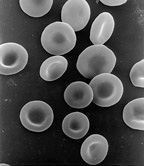
Photo from wikipedia
PURPOSE Hematopoietic stem-cell transplantation–associated thrombotic microangiopathy (HSCT-TMA) is a serious complication with significant mortality and no approved therapy. HSCT-TMA results from endothelial injury, which activates the lectin pathway of complement.… Click to show full abstract
PURPOSE Hematopoietic stem-cell transplantation–associated thrombotic microangiopathy (HSCT-TMA) is a serious complication with significant mortality and no approved therapy. HSCT-TMA results from endothelial injury, which activates the lectin pathway of complement. Narsoplimab (OMS721), an inhibitor of mannan-binding lectin-associated serine protease-2 (MASP-2), was evaluated for safety and efficacy in adults with HSCT-TMA. METHODS In this single-arm open-label pivotal trial (NCT02222545), patients received intravenous narsoplimab once weekly for 4-8 weeks. The primary end point (response rate) required clinical improvement in two categories: (1) laboratory TMA markers (both platelet count and lactate dehydrogenase) and (2) organ function or freedom from transfusion. Patients receiving at least one dose (full analysis set [FAS]; N = 28) were analyzed. RESULTS The response rate was 61% in the FAS population. Similar responses were observed across all patient subgroups defined by baseline features, HSCT characteristics, and HSCT complications. Improvement in organ function occurred in 74% of patients in the FAS population. One-hundred-day survival after HSCT-TMA diagnosis was 68% and 94% in FAS population and responders, respectively, whereas median overall survival was 274 days in the FAS population. Narsoplimab was well tolerated, and adverse events were typical of this population, with no apparent safety signal of concern. CONCLUSION In this study, narsoplimab treatment was safe, significantly improved laboratory TMA markers, and resulted in clinical response and favorable overall survival.
Journal Title: Journal of Clinical Oncology
Year Published: 2022
Link to full text (if available)
Share on Social Media: Sign Up to like & get
recommendations!